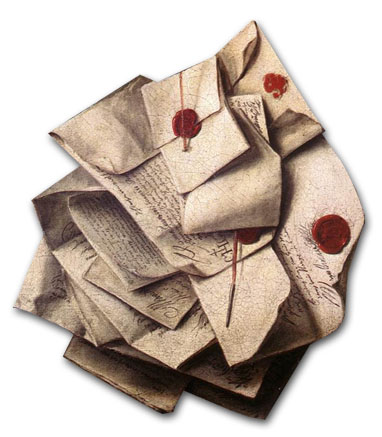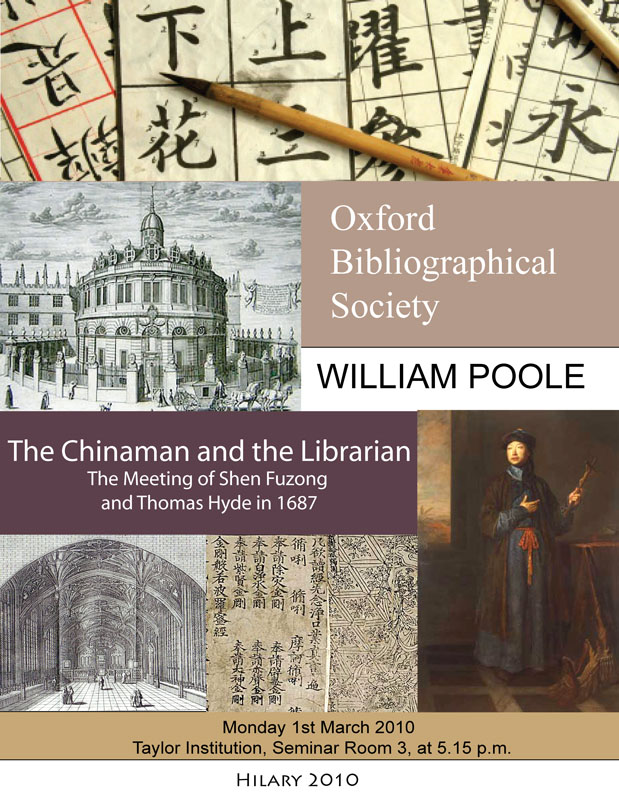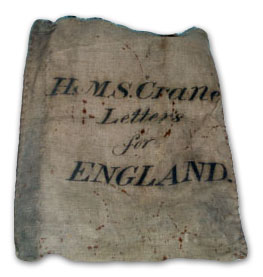* You are viewing the archive for February, 2010
 Papers are sought for a major conference on ‘Cultures of Correspondence in Early Modern Britain, 1550-1640’, which will take place at the University of Plymouth on 14-16 April 2011. According to the organizers, the conference aims to ‘enhance our understanding of epistolary culture and to challenge accepted models of epistolarity through the study of letter-writing practices in all their nuanced complexity, ranging from the textual production of letters, their subsequent delivery and circulation, to the various ways in which letters were read and preserved for posterity’. Abstracts should focus on one the following key themes:
Papers are sought for a major conference on ‘Cultures of Correspondence in Early Modern Britain, 1550-1640’, which will take place at the University of Plymouth on 14-16 April 2011. According to the organizers, the conference aims to ‘enhance our understanding of epistolary culture and to challenge accepted models of epistolarity through the study of letter-writing practices in all their nuanced complexity, ranging from the textual production of letters, their subsequent delivery and circulation, to the various ways in which letters were read and preserved for posterity’. Abstracts should focus on one the following key themes:
- The materiality of the letter: the physicality of correspondence (paper, ink, seals, folding) as well as the social context of epistolarity (composition, delivery, reading, archiving);
- Correspondence networks, the circulation of letters, postal systems, and modes of delivery;
- Letters, news, and intelligence;
- Authenticity, deception, and surveillance: forgeries, secrecy, ciphers, and codes;
- Women’s letters and the gendered nature of letter-writing;
- Epistolary literacies, social hierarchies, and the acquisition and diffusion of letter-writing skills;
- Manuscript letters and letters in print;
- The letter as a cultural genre and the rhetorics of letter-writing;
- Humanistic letter-writing practices and the familiar letter; letter-writing manuals and models; education, pedagogy and learning to write letters;
- Categories or types of letters: suitors’ letters, letters of petition, love letters, letters of condolence;
- Genres of printed letters: prefatory letters, dedicatory letters, address to the readers;
- Staging the letter: letters and letter-writing in drama;
- Editing and the digitization of correspondence.
Proposals of 300 words (including titles) should be sent to James Daybell (james.daybell(at)plymouth.ac.uk) and Andrew Gordon (a.gordon(at)abdn.ac.uk) by 1 July 2010. For further details, please see the full call.

Exploring Early Chinese Correspondences
Dr William Poole, a member of the English Faculty and New College and one of our John Aubrey researchers, is scheduled to give two lectures relevant to the Project in Oxford in the coming fortnight. The first, which will take place at the Taylor Institution under the auspices of the Oxford Bibliographical Society on Monday 1 March at 5.15pm, will explore the earliest surviving English-Chinese correspondence, which dates from 1687-88 (see the poster on the right). The second, which will take place at the Museum of the History of Science on Tuesday 9 March at 7pm, will explore the relationship between Oxford and the Royal Society in the seventeenth century, and forms part of the Museum’s year-long season of activities marking the 350th anniversary of the Society. For further details, see the MHS website. Update: these lectures are now online.

Detail from 'Death on the Battlefield', by Stefano della Bella (c.1648). Image courtesy of Leigh Penman.
Dr Leigh Penman, our Samual Hartlib Postdoctoral Fellow, has published an article entitled ‘The Unanticipated Millennium: Orthodoxy, Heterodoxy and Chiliastic Error in Paul Egard’s Posaune der goettlichen Gnade und Liechts (1623)’ in Pietismus und Neuzeit 35 (2009), 11–45. The article situates Egard and his unusual devotional work within several contexts (biographical, literary, and church historical), and problematizes contemporary distinctions between heterodoxy and orthodoxy. Although Egard was a well-regarded Lutheran pastor, the content of Posaune was decisively influenced by his familiarity with heterodox literature of the period, as well as his personal acquaintance with figures such as Joachim Morsius, Hans Engelbrecht, Nicolaus Teting, and others. Egard’s case demonstrates the power some heterodox ideas (specifically millenarian ones) possessed during this period, as well as the influence of networks of heterodox thinkers.
James Brown
February 06, 2010
Events
Tags: Geography, Spatial Theory
 An international, interdisciplinary conference on ‘From Space to Place: The Spatial Dimension in the History of Western Europe’ will take place at the German Historical Institute on 16-17 April 2010. Organised by the Centre for Research in History and Theory at Roehampton University, and featuring contributions from historians, geographers, anthropologists , archaeologists, and literary scholars, the conference will challenge the idea of place or space in history as an unreflected essentialist category linked to tradition and immutability, and will show how it was instead socially and culturally constructed, mediated, and contested. There will be broader reflections on historiography and spatial theory as well as case studies from a wide chronological span (including many from the medieval and early modern period). For programme and booking information see the conference website.
An international, interdisciplinary conference on ‘From Space to Place: The Spatial Dimension in the History of Western Europe’ will take place at the German Historical Institute on 16-17 April 2010. Organised by the Centre for Research in History and Theory at Roehampton University, and featuring contributions from historians, geographers, anthropologists , archaeologists, and literary scholars, the conference will challenge the idea of place or space in history as an unreflected essentialist category linked to tradition and immutability, and will show how it was instead socially and culturally constructed, mediated, and contested. There will be broader reflections on historiography and spatial theory as well as case studies from a wide chronological span (including many from the medieval and early modern period). For programme and booking information see the conference website.

Testing the record-editing interface.

Comparing calendars.
Yesterday provided us with a valuable opportunity to bring individual CofK researchers together with OULS technical experts for a day of intensive training and consultation on various aspects of our nascent union catalogue of seventeenth-century intellectual correspondence. Scholars working on the Aubrey, Lister, Lhwyd, Hartlib, and Comenius collections explored the latest iteration of the pilot database; tested its online interface for the editing of letter records as well as our free-standing application for the collection of epistolary data; and compared individual calendars against each other as well as Project standards. The first version of the catalogue will be launched at the Universal Reformation conference, which will take place in Oxford on 21-23 September 2010.
 Papers are sought for a major conference on ‘Cultures of Correspondence in Early Modern Britain, 1550-1640’, which will take place at the University of Plymouth on 14-16 April 2011. According to the organizers, the conference aims to ‘enhance our understanding of epistolary culture and to challenge accepted models of epistolarity through the study of letter-writing practices in all their nuanced complexity, ranging from the textual production of letters, their subsequent delivery and circulation, to the various ways in which letters were read and preserved for posterity’. Abstracts should focus on one the following key themes:
Papers are sought for a major conference on ‘Cultures of Correspondence in Early Modern Britain, 1550-1640’, which will take place at the University of Plymouth on 14-16 April 2011. According to the organizers, the conference aims to ‘enhance our understanding of epistolary culture and to challenge accepted models of epistolarity through the study of letter-writing practices in all their nuanced complexity, ranging from the textual production of letters, their subsequent delivery and circulation, to the various ways in which letters were read and preserved for posterity’. Abstracts should focus on one the following key themes:


 An international, interdisciplinary conference on ‘From Space to Place: The Spatial Dimension in the History of Western Europe’ will take place at the
An international, interdisciplinary conference on ‘From Space to Place: The Spatial Dimension in the History of Western Europe’ will take place at the 


 Join
Join 